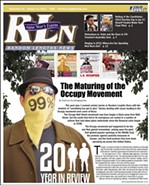Voters And Non-Voters
“Policies Could Take 180 Degree Turn�
If California’s non-voters made their voices heard, state policies could be dramatically reoriented in a more progressive direction, according to a new report from the Public Policy Institute of California (PPIC), “California’s Exclusive Electorate,� written by PPIC research director Mark Baldassare.
California’s electorate is significantly whiter, older, wealthier, and more educated than the population at large. “As its population has become more diverse, its voters have become less representative of that population,� the report, notes. “And the difference between voters and nonvoters is especially stark in attitudes toward government’s role; elected officials; and many social issues, policies, and programs.�
For example:
∑ Governor Schwarzenegger’s reelection chances would plummet. In May 2006, non-voters disapproved far more sharply (61-21 percent) than likely voters (48-42 percent).
∑ The $3 billion affordable housing bond (Prop 1C) could easily pass: 80 percent of nonvoters support it, versus 49 percent of likely voters in a May poll.
∑ California could have bigger government and higher taxes: Nonvoters prefer higher taxes/more services to lower taxes/fewer services by a 66-26 percent margin, compared to 49-44 percent among voters.
The correlations revealed in the report reflect larger relationships observed across time and geographical boundaries. A 2001 paper from the Brookings Institute, “Why Doesn’t the United States Have a European-Style Welfare State?� found a direct correlation between welfare state spending and the size of minority populations—the more minorities, the lower the levels of spending. This held true both internationally (comparing more then 60 different countries) and nationally (comparing all 50 states).
In America, hostility to taxes derives from the Southern slaveholder class, according to a new book, American Taxation, American Slavery by U.C. Berkeley historian Robin Einhorn.
“What I found is that in early American history, slaveholders in particular were terrified of majorities deciding how to tax them. So they came up with strategies of how to stop that,� Einhhorn told Random Lengths.
“There is a long tradition of denying majorities the right to decide how to tax wealth in this country,� she added.
California requires a 2/3 majority to pass its budget, which has effectively blocked tax increases on wealthy Californians to help balance the budget in recent years, even as spending has slashed, and “fees� on community college students and others have skyrocketed. Such legislative restrictions are one form of protection pioneered by slaveholders. Limiting the franchise was another.
“What we’ve got here is that a majority can’t decide how to tax elites because of the lower voter turnout and the skewed population of voters and non-voters,� Einhorn said, commenting on the report.
The Applied Research Center, with offices in Oakland, Chicago and Washington, D.C., has a strong focus on redressing racial inequities. Their legislative report card last year (See “State Government Gets Low Marks On Racial Equity,� RLN, 12/23/05) focused attention on legislation benefiting minorities with strong spillover effects for the entire state.
“Decades of neglect have left California without a strategy to address longstanding inequalities,� the report card stated.
“I can confirm the finding that there’s a disjoint between the needs of the electorate and what the population is voting for,� said report card co-author Tammy Johnson, commenting on PPIC’s report.
A skewed electorate creates a skewed political debate, reflected in campaign ads and literature, Johnson stressed. “There’s a very narrow message that’s sent to them about what they need,� she said.
The result is a “vicious circle� of narrow messages appealing to a narrow electorate with large numbers of potential voters left out.
“If you’re tilling the field in a certain way, you should not be surprised about the crop you get,� she added.
The challenge, which ARC and others are working on, is “To go out and start grooming a new voting base.�







